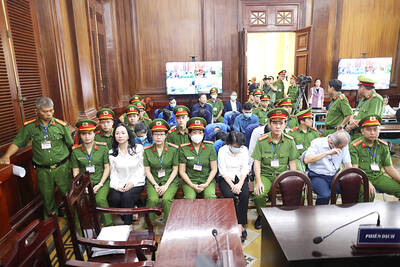India plans to buy 30 armed drones from the US to boost its sea and land defenses as tensions persist with neighbors China and Pakistan, officials with knowledge of the matter said.
The South Asian nation plans to approve next month the US$3 billion purchase of 30 MQ-9B Predator drones manufactured by San Diego-based General Atomics, the officials said, asking not to be identified.
The deal would add to India’s military capabilities as the drones it has now can only be used for surveillance and reconnaissance.
India is emerging as a strategic defense partner for the US, particularly in countering Chinese influence in the Indian Ocean and some areas of Southeast Asia.
Indian Prime Minister Narendra Modi’s government is in the midst of a 10-year, US$250 billion modernization of its military.
Spokespeople from the Indian Ministry of Defence and General Atomics did not respond to requests for comment. Pentagon officials did not respond either.
US Secretary of Defense Lloyd Austin is expected to visit India this month, according to local media, while US President Joe Biden is soon to join counterparts from India, Japan and Australia in the first-ever meeting of the Quadrilateral Security Dialogue.
The leaders are to meet virtually tomorrow, according to an announcement posted on the Indian government’s Web site.
The MQ-9B drone can fly for about 48 hours and carry a payload of about 1,700kg. It would give the Indian Navy the ability to better monitor Chinese warships close to its waters, and equip the army to engage targets along the disputed India-Pakistan border.
Last year, India leased two unarmed MQ-9 Predators as border tensions with China threatened to spin into a full-blown conflict.
In the end they were not deployed after the Indian Air Force expressed apprehension about drones manned by US personnel flying over the border.

Republican US lawmakers on Friday criticized US President Joe Biden’s administration after sanctioned Chinese telecoms equipment giant Huawei unveiled a laptop this week powered by an Intel artificial intelligence (AI) chip. The US placed Huawei on a trade restriction list in 2019 for contravening Iran sanctions, part of a broader effort to hobble Beijing’s technological advances. Placement on the list means the company’s suppliers have to seek a special, difficult-to-obtain license before shipping to it. One such license, issued by then-US president Donald Trump’s administration, has allowed Intel to ship central processors to Huawei for use in laptops since 2020. China hardliners

A top Vietnamese property tycoon was on Thursday sentenced to death in one of the biggest corruption cases in history, with an estimated US$27 billion in damages. A panel of three hand-picked jurors and two judges rejected all defense arguments by Truong My Lan, chair of major developer Van Thinh Phat, who was found guilty of swindling cash from Saigon Commercial Bank (SCB) over a decade. “The defendant’s actions ... eroded people’s trust in the leadership of the [Communist] Party and state,” read the verdict at the trial in Ho Chi Minh City. After the five-week trial, 85 others were also sentenced on

Conjoined twins Lori and George Schappell, who pursued separate careers, interests and relationships during lives that defied medical expectations, died this month in Pennsylvania, funeral home officials said. They were 62. The twins, listed by Guinness World Records as the oldest living conjoined twins, died on April 7 at the Hospital of the University of Pennsylvania, obituaries posted by Leibensperger Funeral Homes of Hamburg said. The cause of death was not detailed. “When we were born, the doctors didn’t think we’d make 30, but we proved them wrong,” Lori said in an interview when they turned 50, the Philadelphia Inquirer reported. The

RAMPAGE: A Palestinian man was left dead after dozens of Israeli settlers searching for a missing 14-year-old boy stormed a village in the Israeli-occupied West Bank US President Joe Biden on Friday said he expected Iran to attack Israel “sooner, rather than later” and warned Tehran not to proceed. Asked by reporters about his message to Iran, Biden simply said: “Don’t,” underscoring Washington’s commitment to defend Israel. “We are devoted to the defense of Israel. We will support Israel. We will help defend Israel and Iran will not succeed,” he said. Biden said he would not divulge secure information, but said his expectation was that an attack could come “sooner, rather than later.” Israel braced on Friday for an attack by Iran or its proxies as warnings grew of